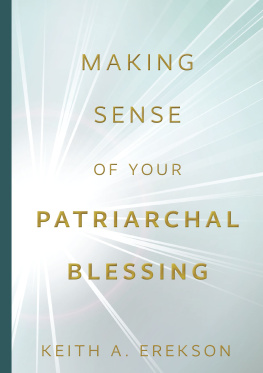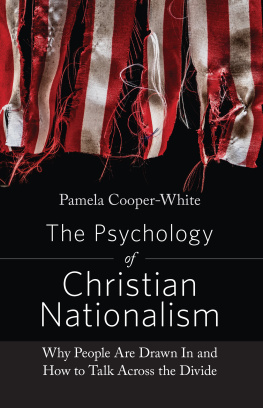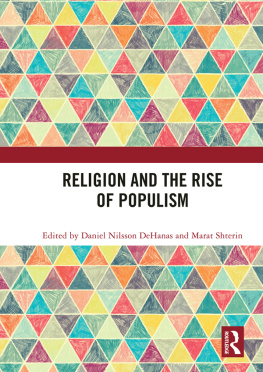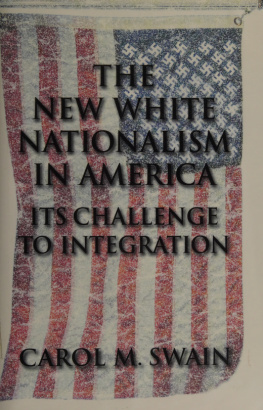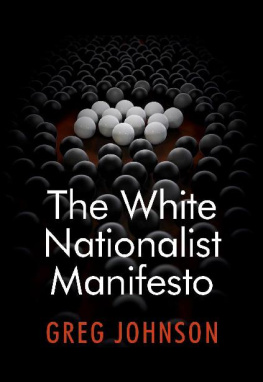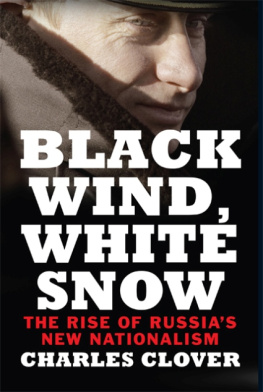Foreword
I am a white patriarchal nationalist. I am not particularly happy with this position, but I did not come willingly. The facts of the matter dragged me along the road despite my best efforts to take detours. This is my journey.
I am an engineer, and I have made a living of looking at problems and solving them. To adequately start in the effort of solving a problem, facts must be collected and then a model constructed. If there are not sufficient facts, then more must be collected. If the model does not reflect reality, then the model is incorrect and should be modified or discarded so that it fits reality. To my surprise, this approach to problem-solving doesnt seem to be employed in the world outside of the STEM fields. I have watched with incredulity as allegedly intellectual people create illusions and then live with them while obvious facts happily thumb their noses at them. What happened to our universities, which supposedly teach analytical thinking and critical analysis? I have begun to think that they are teaching an orthodoxy that has no bearing on reality.
I maintain an interest in people and politics, and in the last decade, I have detected a shift in both people and politics that are all part of the United States. I believe this is caused primarily by the balkanization of the different news sources that are available today. In the 1950s through the early 1990s, most of us collected our news from the three big media companies, ABC, NBC, and CBS. For the most part, these purveyors of news were objective, but more importantly, everyone collected their news primarily from these three sources and formed their opinions from these same sources. With the advent of the internet and a myriad of new sources, the once bias-free sources changed to be biased advocacy news sources as every news company scrambled for a smaller market. As such, the person who watched Fox News would almost never consider watching CNN and vice versa. Almost all of us fall victim to watching the news sources that best reflect our own values in something called a confirmation bias.
The observed problem with the above way of acquiring information about the world is that our data sources are entirely different and, in many cases, simply not factual. The result of this is, elected officials on both sides of the aisle find that their constituents are moving away from the mean and toward the extremes. This is why we find red states like Mississippi turning dark red, whereas blue states like Massachusetts are turning a darker shade of blue.
The inevitable outcome is that these two camps are becoming more and more estranged from each other, and it is becoming more difficult even to agree upon what the pertinent facts actually are. The natural consequence is that the United States is starting to follow the news sources in their balkanization. The Republicans are finding they have almost nothing in common with the Democrats, and policy matters are becoming more difficult to craft.
Additionally, while we were a more homogenized country before the internet, this is now changing and all of us are becoming more radicalized in whichever direction seems best suited for each of us. As such, the feminists and white ethnonationalists are becoming more radicalized because their local news sources are optimized for this small subgroup.
This is truly a problem that has never really come up in the history of the world. Getting news in the past was a luxury, and in the 1960s, who could possibly want more than three news networks? Today one sees websites tuned to feminists as well as neo-Nazis (although the feminists are most likely not tuning into the neo-Nazi sites). At this juncture, one might wonder what is to be done in this situation. From my perspective, the answer lies by taking a more philosophical approach to the problem so that one can understand what is being said and understand what course of action to take.
The problem with taking a more philosophical approach is that philosophy has, for the most part, been an arcane science that has little to do with problem-solving, not to mention the evolving nature of philosophy itself. Philosophy once covered almost all fields of thought outside of eating, drinking, sex, and fighting. Slowly, as the centuries passed, field after field of study was taken away from the forlorn philosophers until they are left today with a narrow field of what I would call applied sociology. However, this is a tool that can be used quite effectively to evaluate data to determine what is valid and what is not. Using the tools of the philosopher, one can come to conclusions that are not only valid but reasonable as well.
I realize that arguing against the best and brightest of Western civilization is a daunting task. It takes one with a superiority complex and certain amount of arrogance to attempt the task, but there you have it.
Another reason for writing this book is, I see many threads that are starting to coalesce into the mainstream, and I will attempt to spend part of my time pulling these threads into a fabric of sorts. Who are the players, and what are the forces that are pushing them to the forefront? Additionally, I will diverge periodically, talking about similar subjects that I see our society completely missing.
I have been reading and watching the great philosophers for some time now and have concluded that they are missing some very important points. Not that it makes much difference, as most do not pay too much attention to these people, but some interesting conclusions have been derived that are worth consideration. I have provided an appendix where I discuss the meanings of fundamental words and provide detailed explanations so a clear understanding of the initial concepts can be understood. Once these concepts are clear, then we can use these tools to create a coherent argument that can be defended. If you cannot sit through reading all the definitions, please read at least through the first three appendices, and then you can flip back to the rest of the book. The first three appendices contain critical information that will be referenced throughout the book. The reason for the discussion on terms is that in the rhetoric of todays conversation, too many of these fundamental words are of little use as they serve only to manipulate the conversation on an emotional level instead of using reason and evidence. As such, I will try to limit the conversation so as to make a valid point and steer clear of emotional conversation. If emotion is used in lieu of a rigid logical structure, then there is almost no hope of going anywhere useful.
I would like to discuss some topics that do not seem to be well-developed or with a new twist that has not been presented to the general audience as a whole. This book is a series of different but related ideas concerning what is happening in the United States today. With a few exceptions, they are not arranged in any particular order, so you can go through them sequentially or pick the chapters that are of particular interest to you. In the end, I will tie all these topics together to show how everything connects as a unified whole.
A note about facts: I use facts to determine how the world works. When I say facts , I do not mean widely held ideas, but objective, verifiable facts. There are some facts that I find disagreeable or downright hideous; however, they are still facts, and the alert reader uses these facts to understand the world around them. If you choose to ignore facts, then your model of the world will fail, and this collapse can be dangerous, not for only you, but for those around you as well. Consider the experiment with communism in the twentieth century. Communists had a model for the world that they thought was accurate, but when they created a government based on this model, the entire system failed with over one hundred million deaths to validate this failure. Cherish facts, especially the unpleasant ones, because they will lead you to a clearer understanding of the world. If you choose illusion over fact, then life may prove to be far more interesting than you intended.



